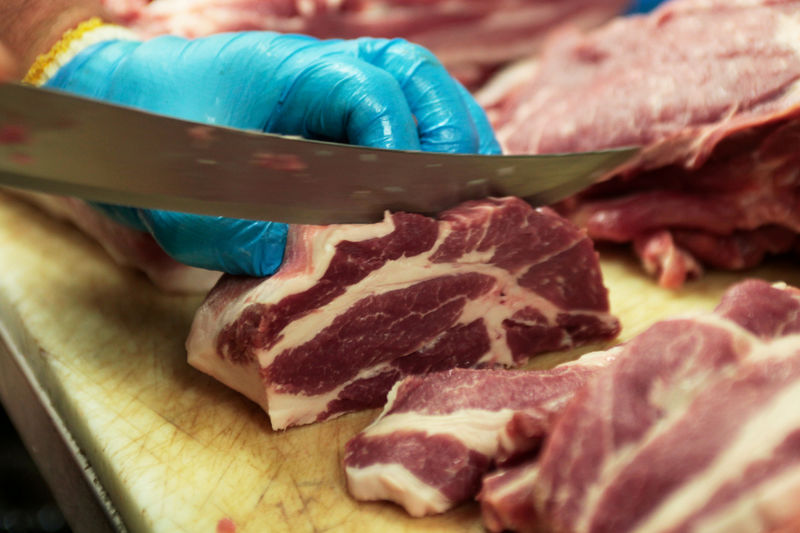By Rod Nickel and Hallie Gu
WINNIPEG, Manitoba/BEIJING (Reuters) - An expanding list of Canadian farm exports is hitting obstacles at Chinese ports, leaving sellers of soybeans, peas and pork scrambling amid a bitter diplomatic dispute.
China has already blocked Canadian canola from Richardson International and Viterra, two of Canada's biggest farm exporters, saying that shipments had pests. Other China-bound canola cargoes have been canceled, forcing exporters to re-sell elsewhere at discount.
Canadian politicians have said the concerns are baseless, and noted that China detained two Canadians after Canada arrested an executive of Chinese telecom company Huawei Technologies Co Ltd in December at the United States' request. China has used nontariff barriers before during diplomatic tensions, most recently against Australian coal.
Now traders say Canadian soybeans and peas face unusual obstacles. Ottawa also warned last week that China was holding up pork shipments over paperwork issues.
Increasing tensions with China, a top buyer for most Canadian farm commodities, have forced farmers to plant other crops, such as wheat, that they hope will not face barriers. China bought C$2.7 billion ($2.01 billion) worth of Canada's canola and C$514 million worth of its pork last year.
To be sure, the spread of African swine fever through China's pig herd has reduced China's need for canola and soybeans to process into feed ingredients.
'YOU BUY FROM CANADA, WE'RE GOING TO MAKE LIFE DIFFICULT'
But since January, port soybean inspections that routinely take a few days now require three weeks, causing Chinese buyers to avoid Canadian products, said Dwight Gerling, president of Canadian exporter DG Global.
"They're basically sending out the signal, 'You buy from Canada, we're going to make your life difficult,'" Gerling said.
Earlier this year, a Chinese buyer told Gerling that a government inspector had found ants in 34 containers (roughly 680 tonnes) of the Canadian soybeans he shipped there. Such a finding would be rare, since the soybeans were stored in concrete silos in Canada and shipped in sealed containers in late autumn, said Gerling, who concluded the buyer was trying to avoid the new hassles of buying from Canada.
"It's just them playing games. (Beijing) is just going to keep putting the screws to us."
China's General Administration of Customs did not reply to a fax seeking comment. Government officials have said their canola ban is a regular inspection and quarantine measure to protect China's farm production and ecological safety.
In a statement, the Canadian agriculture department said it could not confirm that China had imposed stricter measures against farm goods other than canola. Ottawa said this month it hoped to send a delegation to China to discuss the issue.
Gerling's company has halted soybean sales to China and found other buyers in Southeast Asia.
An official at a state-owned crusher in Southern (NYSE:SO) China confirmed that port inspections have tightened on Canadian soybean cargoes.
"We don't have Canadian cargoes coming in as we can't blatantly commit such wrongdoing when the atmosphere is so intense," the official said on condition of anonymity.
Another official in Northern China said his crushing plant scrapped plans to buy Canadian soybeans when the trade dispute flared.
Canada shipped C$1.7 billion worth of soybeans to China in 2018, up sharply year over year, according to the Soy Canada industry group, as China and the United States fought a trade war. But sales have now slowed to a trickle.
Canola has taken the brunt of China's measures.
Chinese buyers have canceled at least 10 cargoes of Canadian canola in the last few weeks, said a Singapore-based trader at a company that runs crushing facilities in China. Some cargoes, around 60,000 tonnes each, have been resold to buyers in Pakistan and Bangladesh at deep discounts, the trader said.
"It is devastating for exporters," the trader said.
ICE (NYSE:ICE) canola futures fell to a more than four-year low on Tuesday as supplies piled up. Growers intend to sow the smallest crop in three years.
On Monday of last week, Ottawa said some Canadian pork exporters used an outdated form to certify shipments to China, causing delays. Such issues arise regularly in commodity trading, but rarely with damaging consequences, said Canadian Pork Council spokesman Gary Stordy.
'VERY STRICT' WITH PEAS
Canadian pea exporters fear they could be next. China imported C$718 million worth of Canadian peas in 2018, according to industry group Pulse Canada, but the pace has slowed.
Chinese authorities have begun scrutinizing import documents and product samples more closely, said Taimy Cruz, director of logistics at Toronto-based BroadGrain Commodities.
China Inspection and Quarantine Authorities now tests samples of each pea shipment before authorizing it for import. They also restrict in some cases the number of soybean shipments allowed under one license, slowing the flow, Cruz said.
Similarly, import authorities now require soybean shipments that change vessels in Singapore and Shanghai - a routine practice called trans-shipping - to reach their destination on a single ship, she said.
While BroadGrain has not seen its cargoes turned back, it has reduced sales to China to avoid risk, concentrating on the Indian subcontinent and South America, she said.
"We have to be extra careful," Cruz said. "They are very strict now."
